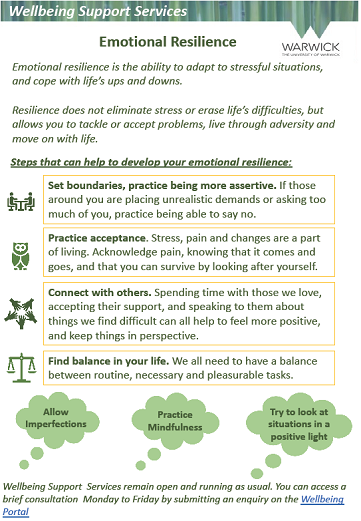Emotional Resilience
Emotional Resilience
Emotional resilience is the ability to adapt to stressful situations, and cope with life’s ups and downs.
Resilience does not eliminate stress or erase life’s difficulties, but allows you to tackle or accept problems, live through adversity and move on with life.
Practice Mindfulness
Allow Imperfections
Try to look at situations in a positive light
Developing Emotional Resilience
Biological and social influences make some people seem more ‘naturally’ resilient than others, but the good news is that everyone can take steps to develop greater personal emotional resilience.
Steps that can help to develop your emotional resilience:
- Set boundaries, practice being more assertive. If those around you are placing unrealistic demands or asking too much of you, practice being able to say no.
- Practice acceptance. Stress, pain and changes are a part of living. Acknowledge pain, knowing that it comes and goes, and that you can survive by looking after yourself. Reflect on what is in your power to change and what is not.
- Connect with others. Spending time with those we love, accepting their support, and speaking to them about things we find difficult can all help to feel more positive, and keep things in perspective.
- Find balance in your life. We all need to have a balance between routine, necessary and pleasurable tasks.
- Develop your self-awareness. How are you feeling? How is your body feeling? Name your feelings. Notice patterns in your feelings…why? Think about what’s helpful and what’s unhelpful to you. Adopt what is helpful and look after yourself.
- Allow yourself to be imperfect. Making mistakes is part of healthy living. Keep going and don’t be discouraged by ‘getting things wrong’.
- Allow others to be imperfect. All of us are fallible. When you are less critical of yourself, you are more able you will be able to extend this grace to others, and to allow them to extend the same to you.
- Look after yourself – practice self-care. Exercising, eating healthily, getting enough sleep, being with loved ones, receiving and giving help, having fun, relaxing, having quiet time, and avoiding too much alcohol or stimulants are all good for us.
- Keep things in perspective. Try to look at day-to-day issues from a broader perspective. Humour, a sense of purpose, love and giving to others, and other spiritual perspectives may also help.
- Be positive. Is there a good side to a bad situation? Look for it. Is possible, see crises as challenges to overcome. Remind yourself of previous successes. Imagine how you think about and treat loved ones, extend the same kindness to yourself. What care, love, patience, kindness, hope, encouragement and forgiveness would you offer this person?
- Express Yourself. Tell others how you feel or express them in other more creative ways. This can help you to unload and ‘let go’ preoccupying thoughts.
- Notice your warning signs. Tiredness, hopelessness, enjoying things less, loss of appetite etc. Then take steps to look after yourself. Practice self-care, talk to someone and if things continue, see your GP.
Getting Support
Links
http://www.psychologytoday.com/blog/design-your-path/201305/10-traits-emotionally-resilient-people
http://stress.about.com/od/understandingstress/a/resilience.htm
http://studentmindsorg.blogspot.co.uk/2016/07/what-does-it-mean-to-be-resilient.html
The University of Warwick cannot be responsible for the content of other websites
Books
Some of the books below are available from the university library
Herald, M (2013) Stepping Stones to Emotional Resilience. A Guide to Embracing your Inner Strength The Resilient Living Collection
Joseph, S (2011) What Doesn’t Kill Us. A guide to overcoming adversity and moving forward London: Piaktus
Robertson, D (2012) Build Your Resilience: Teach Yourself to Survive and Thrive in Any Situation Teach Yourself
Webb, L (2013) How to Cope When Everything Around You Keeps Changing West Sussex: Capstone Publishing Ltd

